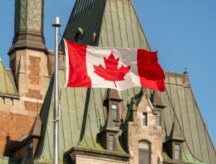Canada’s immigration backlog continues to gradually decrease
Immigration, Refugees and Citizenship Canada (IRCC) reports that the number of applicants in inventory has decreased from approximately 2.2 million to just over 2.1 million over December.
In an email to CIC News, IRCC provided updated data, which is current as of January 2-3.
The inventory across all lines of business has progressed as follows since July 2021:
- January 2-3 2023: 2,152,220 persons
- December 3, 2022: 2,243,097 persons
- November 3, 2022: 2,411,388 persons
- September 30, 2022: 2,600,000 persons (figure rounded by IRCC)
- August 31, 2022: 2,583,827 persons
- July 15-17, 2022: 2,679,031 persons
- June 1-6, 2022: 2,387,884 persons
- April 30-May 2, 2022: 2,130,385 persons
- April 11-12, 2022: 2,031,589 persons
- March 15 and 17, 2022: 1,844,424 persons
- February 1, 2022: 1,815,628 persons
- December 15, 2021: 1,813,144 persons
- October 27, 2021: 1,792,404 persons
- July 6, 2021: 1,447,474 persons
Discover if You Are Eligible for Canadian Immigration
Current inventories
The citizenship inventory stands at 301,388 applicants as of January 3, compared to 314,630 on November 30.
The permanent residence inventory stands at 521,552 people as of January 2, compared to 512,342 as of December 2.
Also on January 3, the temporary residence inventory stood at 1,329,280 people, compared to 1,416,125 persons as of December 3.
Therefore, there were reductions in two of the three major categories, with the largest reduction occurring in the temporary residence inventory at 86,845 fewer applicants than there were on December 3.
| Immigration Category | Persons as of January 2-3 |
|---|---|
| Permanent Residence | 521,552 |
| Temporary Residence | 1,329,280 |
| Citizenship | 301,388 |
| Grand total | 2,152,220 |
Express Entry and PNP inventories
IRCC data shows 48,409 applicants for Express Entry programs waiting in the queue as of January 2. This is an increase of nearly 5,000 since December 2 data, which stood at 43,326.
Among the total people applying for Express Entry programs, there has been an increase of 3,733 applicants for the Canadian Experience Class over the past month and 1,869 for the Federal Skilled Worker Program.
IRCC resumed holding rounds of invitations for Express Entry candidates from all programs in July this year. Draws were limited to candidates in the Provincial Nominee Program (PNP) between September 21, 2021, and July 6, 2022, due to IRCC struggling to meet its service standard of six months or less for Express Entry applications. The pause in Express Entry invitations to Federal Skilled Worker Program (FSWP) and Canadian Experience Class candidates enabled IRCC to reduce the Express Entry inventory and return to a six-month service standard for those who received an invitation to apply as of July 6.
Express Entry draws generally occur every two weeks. However, there has not been an Express Entry draw since November 23. CIC News has reached out to IRCC for comment several times to ask when candidates can expect the next draw with no response.
The PNP has an inventory of 62,720 total applicants (both base and enhanced combined), which is not a significant increase from the December PNP inventory data of 62,343 persons.
Family class inventory
The inventory for all family class immigration programs dropped slightly to 125,631 compared to December 3 when it was 127,091.
The Spouses and Partners sponsorship program is among the largest inventories among all lines of business, at 61,481, a decrease of 1,460 compared with 62,106 on December 2.
The Parents and Grandparents Program (PGP) has an inventory of 52,960 persons compared to 53,770 persons waiting for decisions in December.
Service Standards
IRCC’s webpage that tracks the total inventory of applicants shows that as of November 30 (the most recently available data), 1.09 million applications are considered backlog.
Data from October 31 showed that there were 1.2 million applicants in backlog, meaning IRCC cleared 110,000 applicants from the backlog over November. This is a smaller decrease than was seen between September and October when IRCC cleared 350,000 applicants. Still, the backlog is gradually decreasing despite an increase in the number of applicants for permanent residence currently in inventory.
An application in backlog means it has not been processed within service standards. These standards provide the expected timeline, or goal, for how long it should take to process an application. The service standard is different from the actual amount of time that IRCC takes to process applications. Applications not processed within the service standard for their program are categorized as backlog.
IRCC aims to process 80% of applications across all lines of business within service standards that vary depending on the type of application. For example, a permanent residence application through an Express Entry program has a standard of six months. It is longer for other economic class lines of business. IRCC states its service standard for spousal and child family class sponsorship is 12 months.
Temporary residence applications have service standards that range between 60-120 days depending on the type of application (work or study) and if it was submitted within Canada or from abroad.
Discover if You Are Eligible for Canadian Immigration
© CIC News All Rights Reserved. Visit CanadaVisa.com to discover your Canadian immigration options.
- Do you need Canadian immigration assistance? Contact the Contact Cohen Immigration Law firm by completing our form
- Send us your feedback or your non-legal assistance questions by emailing us at media@canadavisa.com





